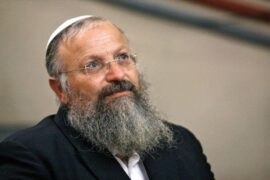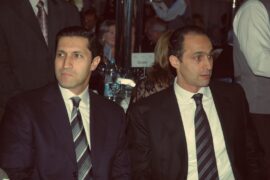US Secretary of State Antony Blinken arrived in Israel Tuesday morning for the fifth time since the Simḥat Torah massacre by Hamas on October 7 in an effort to influence Israel’s handling of the war against Hamas and Iran’s other regional proxies.
The secretary’s visit includes meetings with Israel’s president, prime minister, foreign minister, members of the war cabinet, opposition leaders, the heads of Israel’s intelligence agencies, and the families of Israeli hostages taken by Hamas.
Blinken’s stated goal for the visit is to “support” Israel and avoid a full scale conflict between Israel and Hezbollah.
“It is not in the interest of anyone, Israel, Lebanon, Hezbollah for that matter, to see this escalate,” he told reporters.
But the visit might also aim to influence Israel’s domestic political situation and advance a “two-state” policy. It was leaked that Blinken requested a private meeting with National Unity faction leaders Benny Gantz and Gadi Eisenkot separate from the rest of the war cabinet on Tuesday.
The National Unity party has been soaring in the polls and if elections were held this week, Gantz would likely form the next government.
Just hours after Blinken’s arrival, Defense Minister Yoav Gallant (Likud) made a gesture to Washington by demolishing six Jewish homes in southern Judea, including one recently established by activists associated with the Vision movement.
Although Finance Minister Betzalel Smotrich (Religious Zionism) attempted to prevent the demolitions, Commander of the IDF Central Command Major-General Yehuda Fuchs circumvented the minister’s authority by classifying the situation as an urgent security matter. The only way to make such an argument, however, would be to classify appeasing the US administration as a matter of urgent security.
Blinken’s visit and its ramifications should be understood not only within the context of the current war but also within the context of American efforts to remove Prime Minister Binyamin Netanyahu (Likud) from office.
Barak Ravid reported in late 2022 of a high level White House meeting that took place just after Israel’s November 2022 national elections. The meeting was in reaction to the election results and took place with the purpose of crafting Washington’s policy towards what was expected to be Jerusalem’s new governing coalition.
According to Ravid, the meeting was part of a National Security Council forum and included representatives from the State Department, Defense Department and various US intelligence agencies.
The meeting reportedly focused on potential methods for dealing with the coalition expected to be put together by Netanyahu, and specifically focused on how best to engage with likely coalition partners like Smotrich and Itamar Ben-Gvir (Otzma Yehudit), both known to staunchly oppose US regional interests.
US policy in West Asia has for decades sought to divide the land of Israel into two separate states – each dependent on Washington for survival.
While Smotrich and Ben-Gvir both have troubling records of inflammatory language against Palestinians, American officials have in the past ignored such rhetoric from more westernized Israeli political figures – especially when said language was being deployed to advance US interests by convincing the Israeli public of the need to “separate” from the Palestinians through a “two-state solution.”
What clearly troubled Washington about Smotrich and Ben-Gvir in late 2022 was their principled opposition to dividing the country and their outspoken support for applying full Israeli sovereignty to the West Bank.
Around the same time as this meeting, Blinken had explicitly told the Liberal Zionist J Street conference that the White House “will object to any move [by Israel] to annex the West Bank.”
Over a year later, the US strategy decided upon at that meeting has become clear.
Before Netanyahu’s current coalition was even formed, the money and organization had been put together for a mass protest movement aimed at taking down the government. Former Prime Minister Ehud Barak’s inner circle would play a major role in orchestrating the demonstrations, and judicial reform legislation would be the issue used as a catalyst to put the plan into action.
In April, Barak expressed Washington’s concerns over Israel’s socio-cultural trajectory on Twitter, revealing that “In conversations between Israelis and Western diplomatic officials there are deep concerns raised of the possibility that if the coup in Israel succeeds, a messianic dictatorship will be established in the heart of the Middle East, which has nuclear weapons, and fanatically wishes for a confrontation with Islam centered on the Temple Mount.”
By “coup” Barak actually meant the democratic empowerment of “second Israel” (Mizraḥi, Ḥaredi, and national-religious Jews long marginalized by the more westernized “first Israel”) through their elected representatives – a prospect that causes concern for those who prefer to see Israel as an outpost of American power in the region (or a “villa in the jungle” as Barak himself once famously put it).
In a podcast interview with Haaretz reporter Amir Oren last spring, Gilead Sher — a main organizer of the protests who served as Barak’s chief of staff during his brief tenure as prime minister from 1999-2001— stated openly that he and a small group of accomplices had created the financial and organizational infrastructure for the protest movement even before the coalition had been formed.
The anti-government protests that rocked Israeli society between January and October should therefore be seen not so much as a fight against judicial reform but rather against the previous November’s election results and the socio-political direction Israeli society has been moving in.
Speaking on the podcast, Sher revealed that his plan to sabotage Netanyahu and paralyze the state had been hatched roughly three weeks before the government was formed. In a meeting hosted by Yossi Kutchik, who served as director general for Barak’s administration when he was prime minister, Sher and Kutchik met with former IDF Chief of Staff Dan Halutz and high-tech billionaire Orni Petruschka.
According to Sher, “The four of us met and very quickly, maybe a week or two, we were joined by a number of other people.”
Sher spoke about the involvement Shikma Bressler, a figure who initially gained notoriety as head of the “Black Flags” group of anti-Netanyahu protesters in 2020. Channel 13 revealed early that year that Bressler’s efforts to bring down the prime minister were bankrolled by Barak.
Sher’s claims on the podcast were later corroberated by longtime organizer Eldad Yaniv.
Yaniv had been a senior adviser to Barak during the 1999 election campaign in which US President Bill Clinton sent James Carville and a team of professional political operatives to ensure a Barak victory over Netanyahu.
Yaniv told Israel’s Channel 11 following Sher’s interview that he had been approached just before Israel’s November 2022 elections by the same group that had approached Sher. They had seen polling data that Netanyahu and his allies would win enough seats to form a coalition and they wanted Yaniv to begin planning mass protests against the government they expected to be formed.
According to Yaniv, he declined the offer out of a principled respect for the public’s democratic choice at the ballot.
It should be obvious who approached Yaniv and Sher. The months of mass protests financed and organized by Ehud Barak’s political confidants were something straight out of a CIA playbook. It’s what Washington does whenever a small nation under its thumb appears to be drifting away from its orbit.
Barak has long positioned himself as America’s man in Jerusalem and as the protest movement was reaching its peak, substantial evidence had emerged linking some of the major organizations involved with US President Joe Biden’s administration.
In April, Justice Minister Yariv Levin (Likud) had been caught on a video published by Walla! News explaining to Ḥaredi political operatives that the Biden administration was “working in cooperation with them [the anti-government protest organizers] on this, as you can see from the things said by the people in the government there.”
While Israelis certainly had legitimate concerns regarding some of the details of the government’s judicial reforms that sought to both weaken and disempower the nation’s liberal Supreme Court at a time when the tribes of Israeli society more connected to Jewish identity and tradition were increasing in electoral strength, their fears had been cynically exploited by Barak and his cronnies on behalf of Washington.
It’s also worth noting an important distinction between the positions of many of the Israeli protestors and those of the Biden administration. While most Israelis overwhelmingly supported some form of judicial reform in order to better balance the powers of the state’s branches of government, the White House seemed more interested in ensuring that the Supreme Court remain Israel’s’s most powerful institution.
Since the horrific massacre on October 7, the Biden administration has publicly expressed support for Israel’s war effort against Hamas. But at the same time, Washington has limited Israel’s ability to act against Hezbollah while instructing some of the Israeli organizations leading the anti-judicial reform protests to shift their efforts to pressuring the government to prioritize the return of Israeli hostages over defeating Hamas.
It’s also been made clear that the Americans have two objectives they plan to push as soon as the war winds down. The first is the removal of Netanyahu from office and the second is the revival of Washington’s traditional two-state agenda aimed at partitioning the country into two separate states. From the American perspective, these goals are connected because the US views Netanyahu as the primary obstacle to a “two-state solution” and assumes that removing him from office will likewise remove the resistance to partition.
While several journalists and publications – both local and international – have worked to blame Netanyahu for the failure of Israel’s security forces on October 7 in the eyes of the public, the current government could theoretically still complete its full term if it can succeed at regaining the public’s trust.
The political logic under normal circumstances would dictate that none of Netanyahu’s coalition partners would risk going to elections at a time when they’re performing as poorly in the polls as they currently are. But if an American-backed protest movement succeeds at directing public rage over October 7 at Netanyahu, the prime minister might feel he has no choice but to dissolve the coalition and take the country to new elections.
But this step might not even be necessary if the national camp and its politicians fall into a far more avoidable trap. By limiting Netanyahu’s ability to effectively fight this war, the Biden administration might be hoping to sew dissent amongst the prime minister’s coalition partners and their voters in an effort to destabilize the government on their own. As foolish as this might seem, it should be remembered that the Israeli right isn’t known for its political intelligence.
What’s important to keep in mind is that despite all his many flaws, Binyamin Netanyahu appears to be the only potential prime minister our country has that even recognizes the dangerous nature of the US-Israel relationship.
While all other candidates for the job are either clueless to the threat Washington poses or actually live in the fantasy that the two nations have similar interests, Netanyahu has for years quietly worked to resist American pressure and has now even begun to speak openly about the need to do so (perhaps due to the desperation of his political situation).
One could cynically make the argument that Netanyahu is only speaking out against US pressure and the need to resist it as part of his campaign to retain power. But even if that were the case, it doesn’t change the fact that an Israeli prime minister is saying these things openly and mainstreaming a necessary conversation about Israel’s need for true independence.





